2022年中考英语代词用法课件(共41张PPT)
文档属性
| 名称 | 2022年中考英语代词用法课件(共41张PPT) | 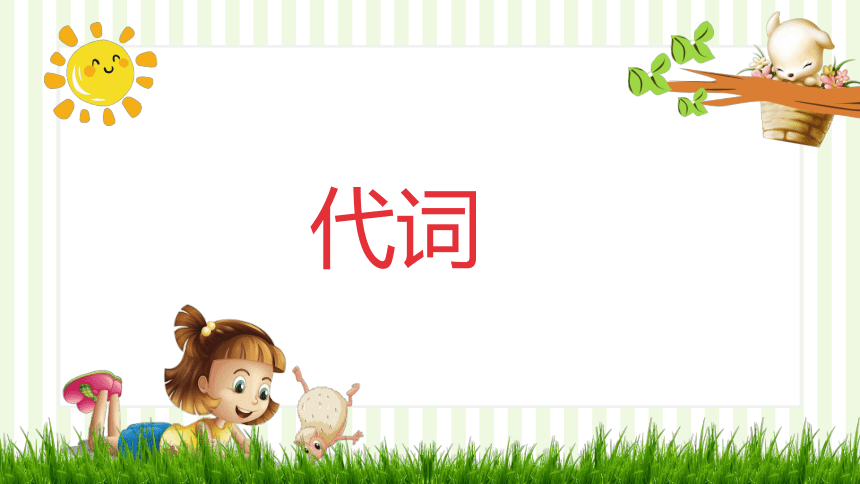 | |
| 格式 | pptx | ||
| 文件大小 | 2.9MB | ||
| 资源类型 | 教案 | ||
| 版本资源 | 人教新目标(Go for it)版 | ||
| 科目 | 英语 | ||
| 更新时间 | 2022-05-21 20:49:20 | ||
图片预览

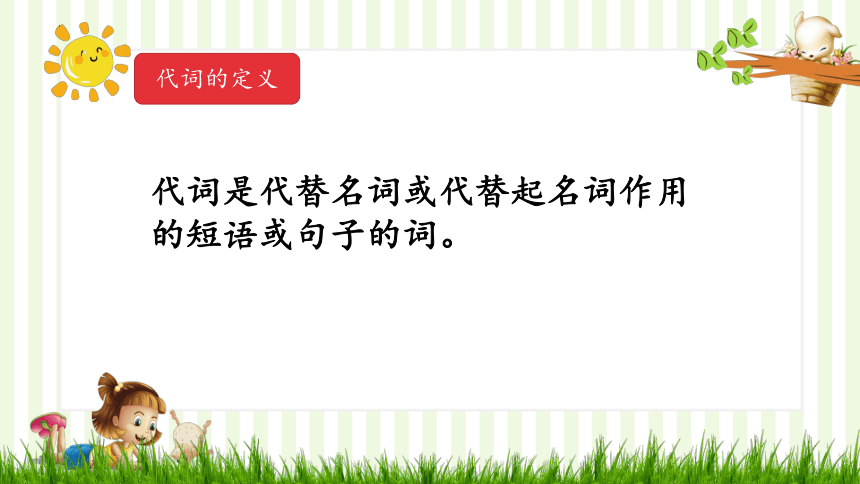
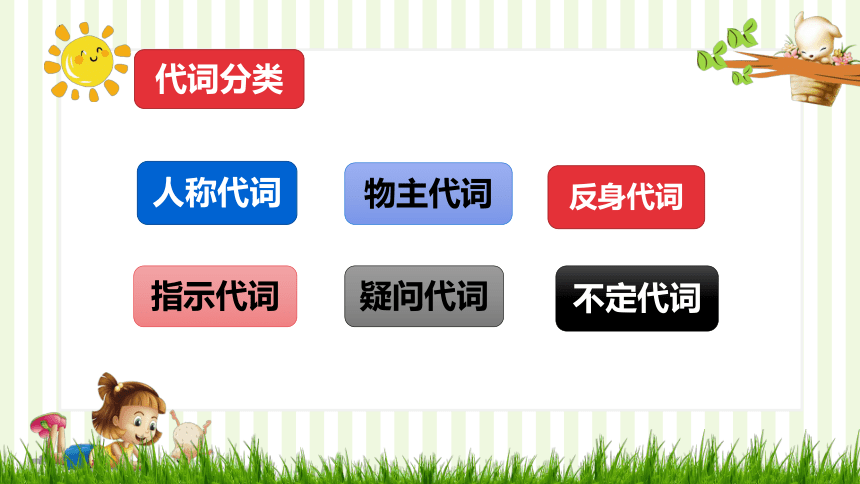

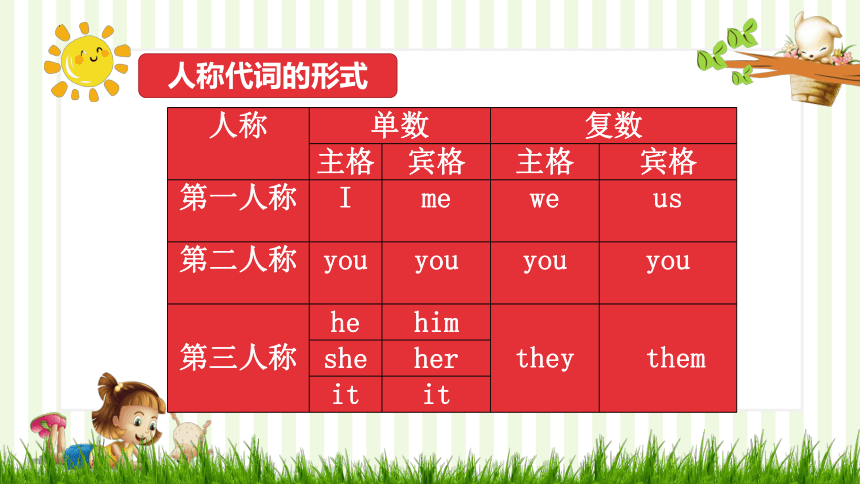
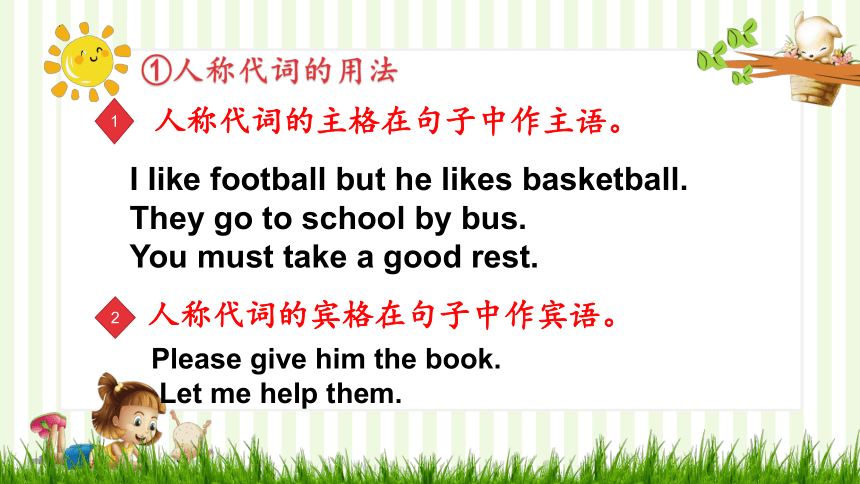
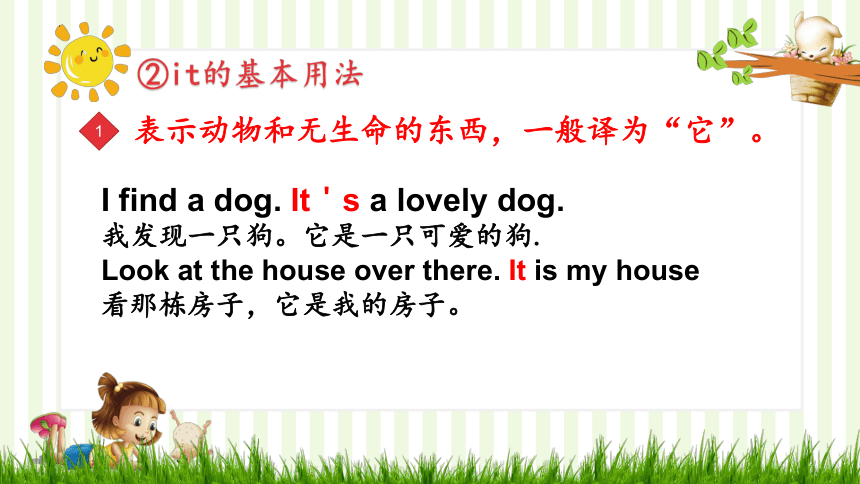
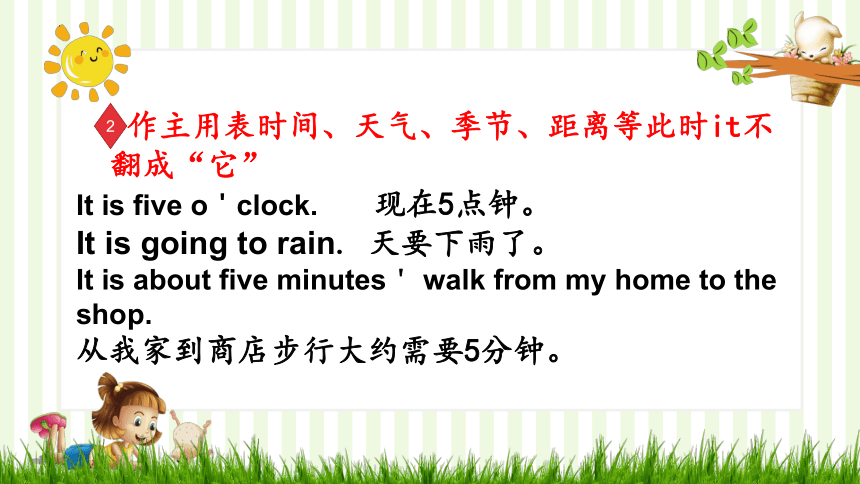
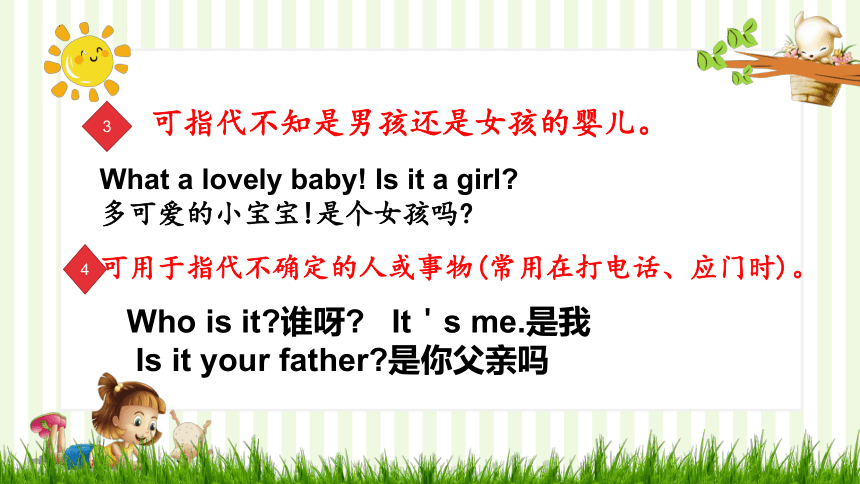
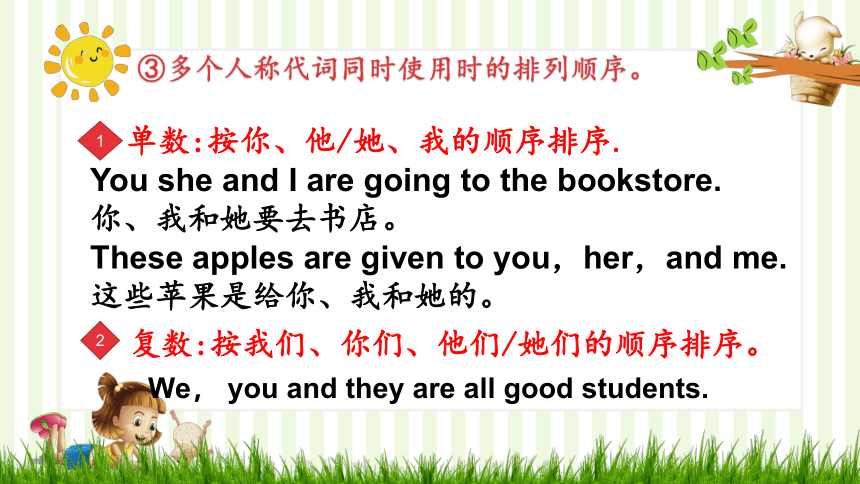
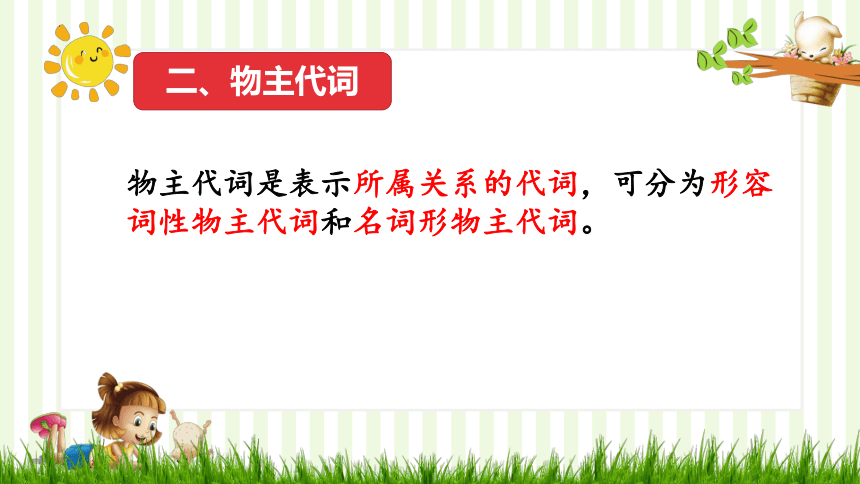
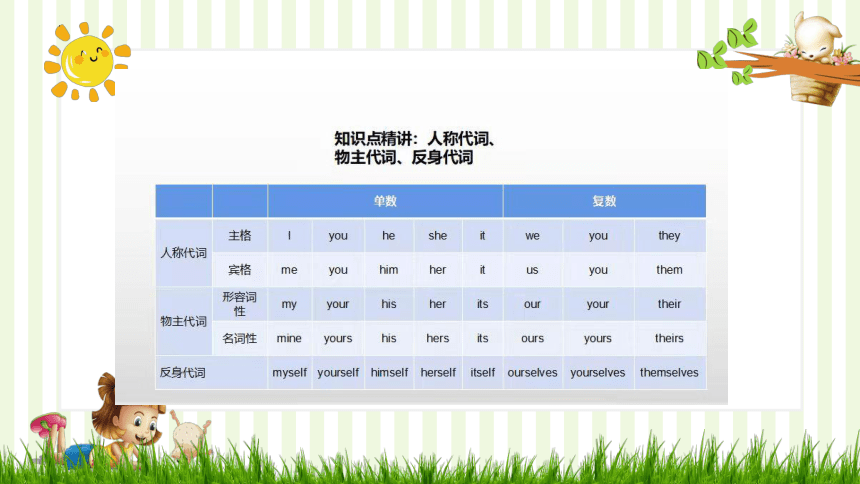
文档简介
(共41张PPT)
代词
代词的定义
代词是代替名词或代替起名词作用的短语或句子的词。
代词分类
人称代词
物主代词
反身代词
指示代词
疑问代词
不定代词
人称代词
人称代词是为了避免重复用来代替前面提到过的人、事物等名词的词,主要包括“你、我、他/她它、你们、我们、他们/她们/它们”等代词。
人称 单数 复数 主格 宾格 主格 宾格
第一人称 I me we us
第二人称 you you you you
第三人称 he him they
them
she her it it 人称代词的形式
①人称代词的用法
1
人称代词的主格在句子中作主语。
2
人称代词的宾格在句子中作宾语。
I Iike football but he likes basketball.
They go to school by bus.
You must take a good rest.
Please give him the book.
Let me help them.
②it的基本用法
1
表示动物和无生命的东西,一般译为“它”。
I find a dog. It's a lovely dog.
我发现一只狗。它是一只可爱的狗.
Look at the house over there. It is my house
看那栋房子,它是我的房子。
2
作主用表时间、天气、季节、距离等此时it不翻成“它”
It is five o'clock. 现在5点钟。
It is going to rain. 天要下雨了。
It is about five minutes' walk from my home to the shop.
从我家到商店步行大约需要5分钟。
3
可指代不知是男孩还是女孩的婴儿。
What a lovely baby! Is it a girl
多可爱的小宝宝!是个女孩吗
4
可用于指代不确定的人或事物(常用在打电话、应门时)。
Who is it 谁呀 It's me.是我
Is it your father 是你父亲吗
③多个人称代词同时使用时的排列顺序。
1
单数:按你、他/她、我的顺序排序.
You she and I are going to the bookstore.
你、我和她要去书店。
These apples are given to you,her,and me.
这些苹果是给你、我和她的。
2
复数:按我们、你们、他们/她们的顺序排序。
We, you and they are all good students.
二、物主代词
物主代词是表示所属关系的代词,可分为形容词性物主代词和名词形物主代词。
①形容词性物主代词的用法。
形容词性物主代词包括my,our,your,his,her , its,their等,在句子中作定语,不可以单独使用,后面需要接名词.
This is my book. Your book is over there.
这是我的书,你的书在那里.
Where did Mary find her pen
玛丽在哪里找到了她的钢笔
②名词性物主代词的用法
名词性物主代词包括ours, yours, his, hers. its,their等,能单独用,相当于名词,在句中可以作主语、表语、宾语等,相当于形容词性物主代词+名词。
My house is near here. Theirs is far from here. (theirs=their house)
我的房子离这儿很近。他们的离这儿很远.
These books are ours.(ours= our books)
这些书是我们的。
You use your own computer, and I use mine (mine=my computer)
你用你的电脑,我用我的.
Our ideas are different from theirs(theirs= their ideas)
我们的想法和他们的不同。
三、反身代词
反身代词是表示“…自己”的一种代词,也称自身代词,主要有以下几个,分别是: myself, yourself, himself, herself,itself,ourselves,yourselves, themselves等.
①在句子中作同位语,用来加强语气,具有“本人”或“自”之类的含义。
I myself can go to school by bike.
我自己能骑车上学。
The doctor himself was ill.
医生自己病倒了.
②在句子中作宾语或表语。
She will buy herself a new car.
她将给自己买辆新车.
Look at the poor boy in the photo. The boy was myself.
看看照片上那个可怜的男孩。这男孩是我本人.
四、指示代词
指示代词是表示“这个"(this)“那个"(that),“这些"(these),“那些”( those)等意义的代词,在句子中可以作主语、宾语、表语和定语等。
①this和 these指在空间和时间上较近的事物,意思是“这个”和“这些”。
This is an English book.
这是一本英语书.
These people are from America.
这些人来自美国.
②that和 those指在空间和时间上较远的事物,意思是“那个”和“那些”
That is not a new car.
那辆车不是新的。
In those years, they lived a simple but happy life.
在那些岁月里,他们过着简单但福的生活。
五、疑问代词
疑问代词是用于表示疑问并帮助构成特殊疑问句的代词。常见的疑问代词有what, which,who, whose,whom等,其中who, whose,whom用来指人,what,which多用来指物.
1
what用于对事或物提问,意思是“什么”
what do you want
你想要点什么
What day is it today
今天星期几
2
who用于对人的提问,意思是“谁”。
Who is standing over there
谁站在那里
Who would like to go with me
谁意我一起
3
Whose表示所属关系,意思是“谁的”.
Whose bikes are these
这些自行车是的
Whose books are over there
那些书是谁的
4
whom是who的格,意思是“谁”。
Whom do you like best
你最喜欢谁
Whom do they like to go with
他们想和谁一起去
5
which可用于对人或事、物进行提间,意思是“哪一个”。
Which one Is your sister
哪个是你的姐姐
Which do you like, tea or coffee
你喜欢喝茶还是咖啡
六、不定代词
不定代词是指不具体代替任何特定名词或形容词的一种代词。常见的不定代词主要有:Some,any,many,much, all, both,each, every, other, another,以及any,some,no与 thing,one,boy构成的复合代词 anyone, someone, anybody, somebody等些常见的不定代词的用法.
不定代词用法
①some和any
some和any都表示“一些”的意思,但some通常用于肯定句,而any通常用于否定句或疑问句。
1
I want to buy some books.
我想买几本书。
They don' t have any money left.
他们一分钱也没有了。
Do you have any brothers 你有兄弟吗
2
any还可表示“任何,任一”的意思既可用于肯定句,也可用于否定句中。
Any student in my school can swim.
我们学校任何一名学生都会游泳。
some用于疑句中、表示望得到对方肯定回答。
Would you like some apples
你想要些苹果
3
②each和 every
两个词都有“每个”的意思。each强调个体,尤其指两个或两个以上中的每个,可以单独使用;而 every不单独使用,后面需要接名词、强调整体,包括的对象至少三个,有时含义接近all.
1
Each has got some good ideas.
每个人都有一些好主意。
Every student goes to school in school uniform.
每个学生都穿校服上学.
③all和both
both和all表示“都”的意思。both用于表示两个人或物;面all是三个或三个以上的人或物。
1
We all like football.
我们门都喜欢足球。一一指三个人或三个人以上
We both bought three books =Both of us bought three books.
我都买了三本书。一一指两个人
2
both还可以构成both……and……(两者都…)句型。
Both Mary and Peter like p aying basketball after school.
玛丽和彼得两个人都喜欢放学后打篮球
④many和much
1
many和much都有“许多、大量、很多”的意思。many用于修饰复数可数名词,而much用于修饰不可数名词。
Many people go to the park in the their spare
time.
很多人在闲暇时间到公园去。
Do you have much time to play
你有很多时间去玩吗
④many构成的短语作主语时,谓语动词用复数形式;而much构成的短语作主语时,谓语动词用单数形式。
Many of us have computers.
我们很多人都有电脑。
Too much salt does you no good.
吃太多的盐对你没有好处。
③other和 another
1
other的意思是“别的,其他的”,既可指人,亦可指物,作名词时有复数形式 others; another的意思是“另一个”。
When you are in trouble, you can go to ask other people for help
当你遇到麻烦的时候,你可以向别人求助。
Would you like another cup of tea?
你还想再要一杯茶吗
⑥either和 neither
1
either的意思是“(两者中)任何后面的谓语动词要用单数形式。
Either of the books Is interesting.
两本书都是有趣的。
There are many trees on either side of the street.
街道两侧有很多树。
2
neither的意思是“(两者中)没有一个、两者都不……
与 either的意思刚好相反,后面的谓语动词也要用单数形式。
Neither of us likes coffee.
我们俩都不喜欢咖啡。
I like neither of the two gifts.
两份礼物我都不喜欢。
感谢您的观看
感谢您的观看
The user can demonstrate on a projector or computer, or print the presentation and make it into a film to be used in a wider field
代词
代词的定义
代词是代替名词或代替起名词作用的短语或句子的词。
代词分类
人称代词
物主代词
反身代词
指示代词
疑问代词
不定代词
人称代词
人称代词是为了避免重复用来代替前面提到过的人、事物等名词的词,主要包括“你、我、他/她它、你们、我们、他们/她们/它们”等代词。
人称 单数 复数 主格 宾格 主格 宾格
第一人称 I me we us
第二人称 you you you you
第三人称 he him they
them
she her it it 人称代词的形式
①人称代词的用法
1
人称代词的主格在句子中作主语。
2
人称代词的宾格在句子中作宾语。
I Iike football but he likes basketball.
They go to school by bus.
You must take a good rest.
Please give him the book.
Let me help them.
②it的基本用法
1
表示动物和无生命的东西,一般译为“它”。
I find a dog. It's a lovely dog.
我发现一只狗。它是一只可爱的狗.
Look at the house over there. It is my house
看那栋房子,它是我的房子。
2
作主用表时间、天气、季节、距离等此时it不翻成“它”
It is five o'clock. 现在5点钟。
It is going to rain. 天要下雨了。
It is about five minutes' walk from my home to the shop.
从我家到商店步行大约需要5分钟。
3
可指代不知是男孩还是女孩的婴儿。
What a lovely baby! Is it a girl
多可爱的小宝宝!是个女孩吗
4
可用于指代不确定的人或事物(常用在打电话、应门时)。
Who is it 谁呀 It's me.是我
Is it your father 是你父亲吗
③多个人称代词同时使用时的排列顺序。
1
单数:按你、他/她、我的顺序排序.
You she and I are going to the bookstore.
你、我和她要去书店。
These apples are given to you,her,and me.
这些苹果是给你、我和她的。
2
复数:按我们、你们、他们/她们的顺序排序。
We, you and they are all good students.
二、物主代词
物主代词是表示所属关系的代词,可分为形容词性物主代词和名词形物主代词。
①形容词性物主代词的用法。
形容词性物主代词包括my,our,your,his,her , its,their等,在句子中作定语,不可以单独使用,后面需要接名词.
This is my book. Your book is over there.
这是我的书,你的书在那里.
Where did Mary find her pen
玛丽在哪里找到了她的钢笔
②名词性物主代词的用法
名词性物主代词包括ours, yours, his, hers. its,their等,能单独用,相当于名词,在句中可以作主语、表语、宾语等,相当于形容词性物主代词+名词。
My house is near here. Theirs is far from here. (theirs=their house)
我的房子离这儿很近。他们的离这儿很远.
These books are ours.(ours= our books)
这些书是我们的。
You use your own computer, and I use mine (mine=my computer)
你用你的电脑,我用我的.
Our ideas are different from theirs(theirs= their ideas)
我们的想法和他们的不同。
三、反身代词
反身代词是表示“…自己”的一种代词,也称自身代词,主要有以下几个,分别是: myself, yourself, himself, herself,itself,ourselves,yourselves, themselves等.
①在句子中作同位语,用来加强语气,具有“本人”或“自”之类的含义。
I myself can go to school by bike.
我自己能骑车上学。
The doctor himself was ill.
医生自己病倒了.
②在句子中作宾语或表语。
She will buy herself a new car.
她将给自己买辆新车.
Look at the poor boy in the photo. The boy was myself.
看看照片上那个可怜的男孩。这男孩是我本人.
四、指示代词
指示代词是表示“这个"(this)“那个"(that),“这些"(these),“那些”( those)等意义的代词,在句子中可以作主语、宾语、表语和定语等。
①this和 these指在空间和时间上较近的事物,意思是“这个”和“这些”。
This is an English book.
这是一本英语书.
These people are from America.
这些人来自美国.
②that和 those指在空间和时间上较远的事物,意思是“那个”和“那些”
That is not a new car.
那辆车不是新的。
In those years, they lived a simple but happy life.
在那些岁月里,他们过着简单但福的生活。
五、疑问代词
疑问代词是用于表示疑问并帮助构成特殊疑问句的代词。常见的疑问代词有what, which,who, whose,whom等,其中who, whose,whom用来指人,what,which多用来指物.
1
what用于对事或物提问,意思是“什么”
what do you want
你想要点什么
What day is it today
今天星期几
2
who用于对人的提问,意思是“谁”。
Who is standing over there
谁站在那里
Who would like to go with me
谁意我一起
3
Whose表示所属关系,意思是“谁的”.
Whose bikes are these
这些自行车是的
Whose books are over there
那些书是谁的
4
whom是who的格,意思是“谁”。
Whom do you like best
你最喜欢谁
Whom do they like to go with
他们想和谁一起去
5
which可用于对人或事、物进行提间,意思是“哪一个”。
Which one Is your sister
哪个是你的姐姐
Which do you like, tea or coffee
你喜欢喝茶还是咖啡
六、不定代词
不定代词是指不具体代替任何特定名词或形容词的一种代词。常见的不定代词主要有:Some,any,many,much, all, both,each, every, other, another,以及any,some,no与 thing,one,boy构成的复合代词 anyone, someone, anybody, somebody等些常见的不定代词的用法.
不定代词用法
①some和any
some和any都表示“一些”的意思,但some通常用于肯定句,而any通常用于否定句或疑问句。
1
I want to buy some books.
我想买几本书。
They don' t have any money left.
他们一分钱也没有了。
Do you have any brothers 你有兄弟吗
2
any还可表示“任何,任一”的意思既可用于肯定句,也可用于否定句中。
Any student in my school can swim.
我们学校任何一名学生都会游泳。
some用于疑句中、表示望得到对方肯定回答。
Would you like some apples
你想要些苹果
3
②each和 every
两个词都有“每个”的意思。each强调个体,尤其指两个或两个以上中的每个,可以单独使用;而 every不单独使用,后面需要接名词、强调整体,包括的对象至少三个,有时含义接近all.
1
Each has got some good ideas.
每个人都有一些好主意。
Every student goes to school in school uniform.
每个学生都穿校服上学.
③all和both
both和all表示“都”的意思。both用于表示两个人或物;面all是三个或三个以上的人或物。
1
We all like football.
我们门都喜欢足球。一一指三个人或三个人以上
We both bought three books =Both of us bought three books.
我都买了三本书。一一指两个人
2
both还可以构成both……and……(两者都…)句型。
Both Mary and Peter like p aying basketball after school.
玛丽和彼得两个人都喜欢放学后打篮球
④many和much
1
many和much都有“许多、大量、很多”的意思。many用于修饰复数可数名词,而much用于修饰不可数名词。
Many people go to the park in the their spare
time.
很多人在闲暇时间到公园去。
Do you have much time to play
你有很多时间去玩吗
④many构成的短语作主语时,谓语动词用复数形式;而much构成的短语作主语时,谓语动词用单数形式。
Many of us have computers.
我们很多人都有电脑。
Too much salt does you no good.
吃太多的盐对你没有好处。
③other和 another
1
other的意思是“别的,其他的”,既可指人,亦可指物,作名词时有复数形式 others; another的意思是“另一个”。
When you are in trouble, you can go to ask other people for help
当你遇到麻烦的时候,你可以向别人求助。
Would you like another cup of tea?
你还想再要一杯茶吗
⑥either和 neither
1
either的意思是“(两者中)任何后面的谓语动词要用单数形式。
Either of the books Is interesting.
两本书都是有趣的。
There are many trees on either side of the street.
街道两侧有很多树。
2
neither的意思是“(两者中)没有一个、两者都不……
与 either的意思刚好相反,后面的谓语动词也要用单数形式。
Neither of us likes coffee.
我们俩都不喜欢咖啡。
I like neither of the two gifts.
两份礼物我都不喜欢。
感谢您的观看
感谢您的观看
The user can demonstrate on a projector or computer, or print the presentation and make it into a film to be used in a wider field
同课章节目录
- 词法
- 名词
- 动词和动词短语
- 动词语态
- 动词时态
- 助动词和情态动词
- 非谓语动词
- 冠词
- 代词
- 数词和量词
- 形容词副词及其比较等级
- 介词和介词短语
- 连词和感叹词
- 构词法
- 相似、相近词比较
- 句法
- 陈述句
- 一般疑问句和否定疑问句
- 特殊疑问句及选择疑问句
- 反意疑问句
- 存在句(There be句型)
- 宾语从句
- 定语从句
- 状语从句
- 主谓一致问题
- 简单句
- 并列句
- 复合句
- 主谓一致
- 主、表语从句
- 名词性从句
- 直接引语和间接引语
- 虚拟语气
- 感叹句
- 强调句
- 倒装句
- 祈使句
- 句子的成分
- 句子的分类
- 题型专区
- 单项选择部分
- 易错题
- 完形填空
- 阅读理解
- 词汇练习
- 听说训练
- 句型转换
- 补全对话
- 短文改错
- 翻译
- 书面表达
- 任务型阅读
- 语法填空
- 其他资料
